CEO Talks: Noura Sakkijha on Building a Modern Jewelry Brand for Women
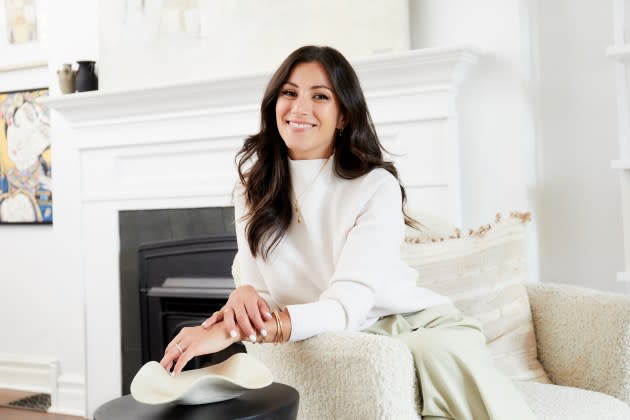
LONDON — Noura Sakkijha, cofounder of Mejuri, comes from a family of jewelers, but her ambitions were never set in gold as she pursued a career as an industrial engineer at the Canadian Imperial Bank of Commerce. However, in 2013 she quit her job and started ideating her jewelry brand with her husband, Majed Masad.
Mejuri, which launched in 2015, says it sells two pairs of hoops every minute and this year, the brand said, it has sold 600,000 earrings in three hoop styles through its own direct-to-consumer channel and via its 28 stores worldwide. It opened its 29th store, and the third one in London, on King’s Road in early November.
More from WWD
The brand’s other London units are located in Marylebone and Covent Garden, with customers in the 18- to 40-year-old age group driving sales of solid gold jewelry that’s classical with a subtle fun twist using minimal color and diamonds that are lab grown and conflict free.
Mejuri caters mainly to women, although the male consumer cohort is growing steadily. This year the brand said it has seen a 1,000 percent increase in new customers and 2,000 percent growth in returning customers in the U.K. since 2020. Globally, Mejuri has 2.1 million customers and has shipped 4 million packages to date.
Here, Sakkijha talks about how she expanded the brand outside the wholesale channel; the importance of retail; sustainability and social impact, and what it means to be a female CEO.
WWD: Why did you start Mejuri?
Noura Sakkijha: I’m the third generation in my family to work in jewelry — it’s something that runs in my DNA. The family business was very traditional — almost similar to the big brands, very much focused on gifting, high-end products marketed for men to buy for women — how fine jewelry is packaged in our minds. That didn’t resonate with me, so I took a detour by studying industrial engineering and moving to Canada to work in internal consulting at one of the big banks [Canadian Imperial Bank of Commerce]. When I started making disposable income, that is when I wanted to buy jewelry for myself, but I didn’t necessarily feel like there was a brand that I gravitated to. There were a lot of next-generation brands popping up in beauty and fashion, and I wanted to create a brand where women could buy jewelry for themselves.
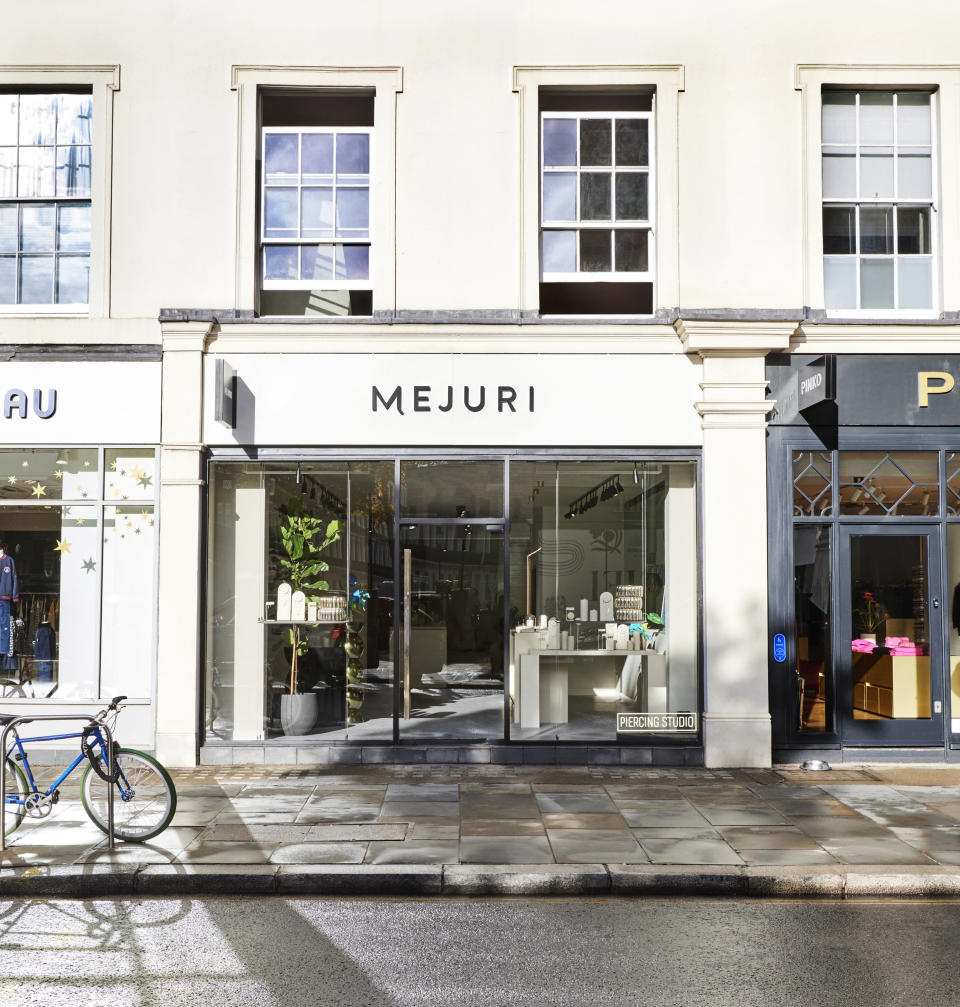
WWD: What skills did you take away?
N.S.: I took the frameworks of problem solving — I can be very methodical and my practice in engineering reconfirmed that. I was lucky to have some great managers — especially my last one. I learned a lot of leadership skills through him, one of which is how transparency of feedback is a gift.
WWD: How has feedback influenced your style of working?
N.S.: I have a ReadMe [software that collects anonymous feedback from anyone in the company]. I’m very clear on expectations. I trust the people that I’ve hired. And once we’ve created an impeccable agreement, I trust that they’ve got it. And if they don’t, then they have to proactively inform me. I give feedback and I ask for feedback; it’s a two-way street.
WWD: What qualities and skills are you looking for in an individual when you’re hiring?
N.S.: We have to vet for technical expertise, but I find that the easy part because you can always teach that, but one of the hardest things is mindset. It’s something you can’t teach. What I mean by that is, people who have a growth mindset, who want to learn. They recognize they don’t know everything. Once you know that you don’t know everything, then the sky is the limit in terms of how you’re going to grow and what growth you bring to the business. Passion is another, you can’t teach somebody self-motivation — they have to wake up excited about achieving things, and it’s not a transactional relationship. I always quote Henry Ford, who said: “Whether you think you can, or you think you can’t — you’re right.”
WWD: Did you find it intimidating coming into the jewelry space?
N.S.: I didn’t find it intimidating because this is not rocket science, and because people want jewelry. If you look at the industry, only 20 percent of the world’s jewelry is sold as branded. The rest is completely fragmented, which means there’s a massive opportunity for a brand to come and then create a next-generation brand and have more consolidation in the jewelry industry. From a logical standpoint, it made sense and from a passion standpoint, people want jewelry and it’s all about execution with the right ingredients. When I was fundraising, everybody was pitching AI and I was pitching jewelry. That is when you start to see the lack of interest in the company. I don’t know if it’s [because I’m] a woman, but fundraising for a traditional type industry, as opposed to something as sexy as AI, was not an easy feat.
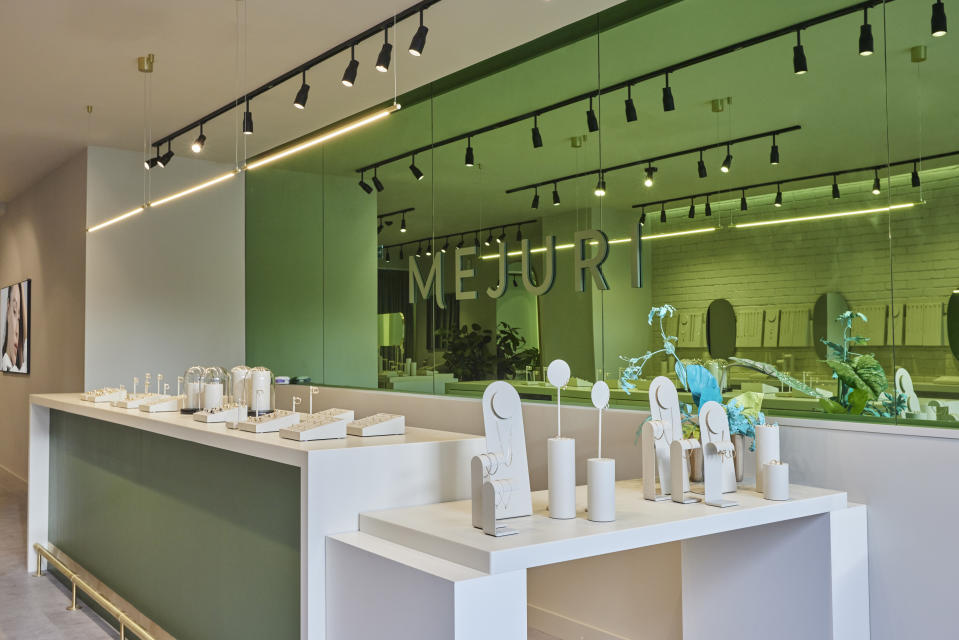
WWD: How did you start the business?
N.S.: I started off with a few grants, but from the get-go, we knew that we wanted to go through the VC round as my partner and I tremendously believed in the opportunity, and we wanted it to go relatively fast and to build a global brand.
My partner was in private equity, he had more financial knowledge, and we [worked with] a start-up accelerator, which is when you begin to learn all about the VC route: How do you raise money? What is the valuation? How do you negotiate? It was a great training ground. I don’t think anything quite frankly prepares you for it, not even all the podcasts out there.
WWD: What has been the best lesson that you have learned?
N.S.: One of them is, your failure is a data point, it’s not something that should discourage you. When I moved to San Francisco for six months as part of the accelerator program, there was something extremely liberating about being there, because that’s where all start-ups [are born]. The mindset over there is that people wear failures as badges of honor, and it’s something completely different from the culture I come from, where it’s almost a stigma. It wasn’t so easy for me to raise my seed round in comparison to my peers. That really pushed us to focus on what builds value for the customer, which helped us set some good foundations for the business. The third is never underestimate the power of surrounding yourselves with like-minded people — that was therapeutic for me.
WWD: Mejuri has been so digitally savvy, but now it’s expanding in physical retail. How do you marry those two components?
N.S.: It was around 2017 we started to get inbound interest from customers who wanted to come and see the products, particularly around shopping periods like the holidays. We used to host our customers in our offices. We started off with a showroom and our assumption was that the existing Mejuri community would come, but we saw that 60 percent of the transactions that happened were from new customers. It made us think about how we could build a stronger connection with our community via activations and events. We opened our first store in Toronto, and then New York. We started to open more stores, but then the pandemic slowed us down.
WWD: What is your retail expansion plan?
N.S.: We started heavily in [our home markets of] Canada and the U.S. Right now we’re growing quickly in the U.K. and we’ve just launched a pop-up in Australia. Our goal is to build a global brand. When we talk about geography, we know that we’re going to be strong in North America. Next is going to be Europe, and obviously I dream of Asia and the Middle East. Our strategy for retail is to continue growing our fleet, but we don’t want to necessarily have an insane number of stores. In the next five years I would like us to be in more countries, for us to be a more global brand at that point.
WWD: Mejuri doesn’t have any wholesalers, everything is controlled. Why have you decided to keep a tight hold on distribution?
N.S.: One of the key things for us is controlling the experience for the customers, it’s something that can help us learn and grow. Our stores work really well and it feels like a channel that we can continue to expand and do partnerships from a strategic standpoint.
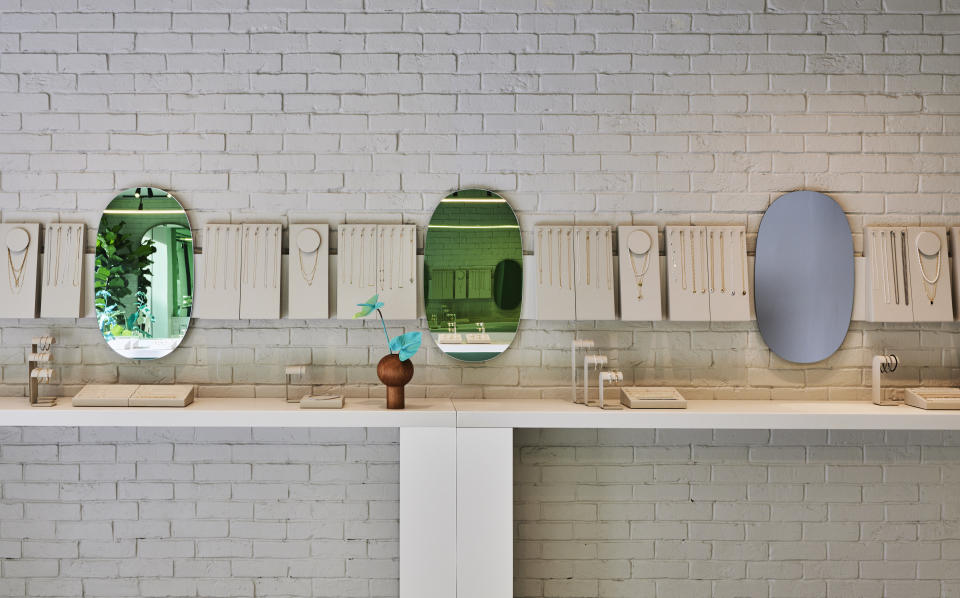
WWD: How do you expand Mejuri while still maintaining a healthy business?
N.S.: It’s about being very cautious about what expansion looks like, and what kind of risks you want to take — for us, we delayed some international expansion decisions because we were worried about the pandemic and the post-pandemic dilemma that’s been happening.
WWD: Are you approaching the U.K. customer differently?
N.S.: In the U.K., we see a lot of appetite for 14-karat and diamond jewelry, as well as pearls.
Entry customers gravitate toward more of the dainty pieces and as they become more accustomed to the brand, they graduate into heavier pieces and it works the same with men’s jewelry. When we opened the stores, men were shopping from our main collections and that’s when we expanded on specific aesthetics.
WWD: How did the pandemic affect the brand?
N.S.: During the pandemic, we saw a lot of earrings sales because everybody was in front of a screen, so that was a category we expanded on. We actually started to expand our price point to the higher end, as we had these plans before the pandemic. It was a bit risky because everybody was worried and wanted to stick to a lower price point, but we found that we’ve nurtured a community that is quite engaged, and they wanted to graduate to the higher price point.
WWD: Is there a limit to how exclusive Mejuri will become?
N.S.: The main thing is there’s no exclusivity. We want fine jewelry to be accessible and part of everyday life. The price points will expand, but it’s not going to become more expensive.
WWD: How has the meaning of luxury changed for you since starting Mejuri?
N.S.: We talk about redefining luxury a lot because luxury doesn’t have to be extremely inaccessible — we still care so much about design, craftsmanship, materials and sustainability, all of the components that are traditionally luxury. The average assortment for us is under $300. There is more democratization of luxury, in terms of accessibility. What I like about jewelry is there’s an element of customization because the way every piece is signed is different from the way somebody else wears it.
WWD: How important is sustainability as a pillar to the company?
N.S.: Ever since we started we’ve been very conscious about choosing and prioritizing to work with those with manufacturers who are certified by third-party organizations like RJC. In 2020, we switched to 80 percent recycled gold because we had committed to reducing our emissions; we are now at 95 percent recycled silver. We use The Kimberley Process, which is just one of the frameworks in the industry to ensure our diamonds are conflict free. We wanted to take sustainability to the next level as we continue to grow, so last year we hired a vice president of sustainability and social impact, Holly McHugh.
Sustainability is complex and requires a lot of expertise, you need somebody who is 10 times better than you to handle it and take it to the next level.
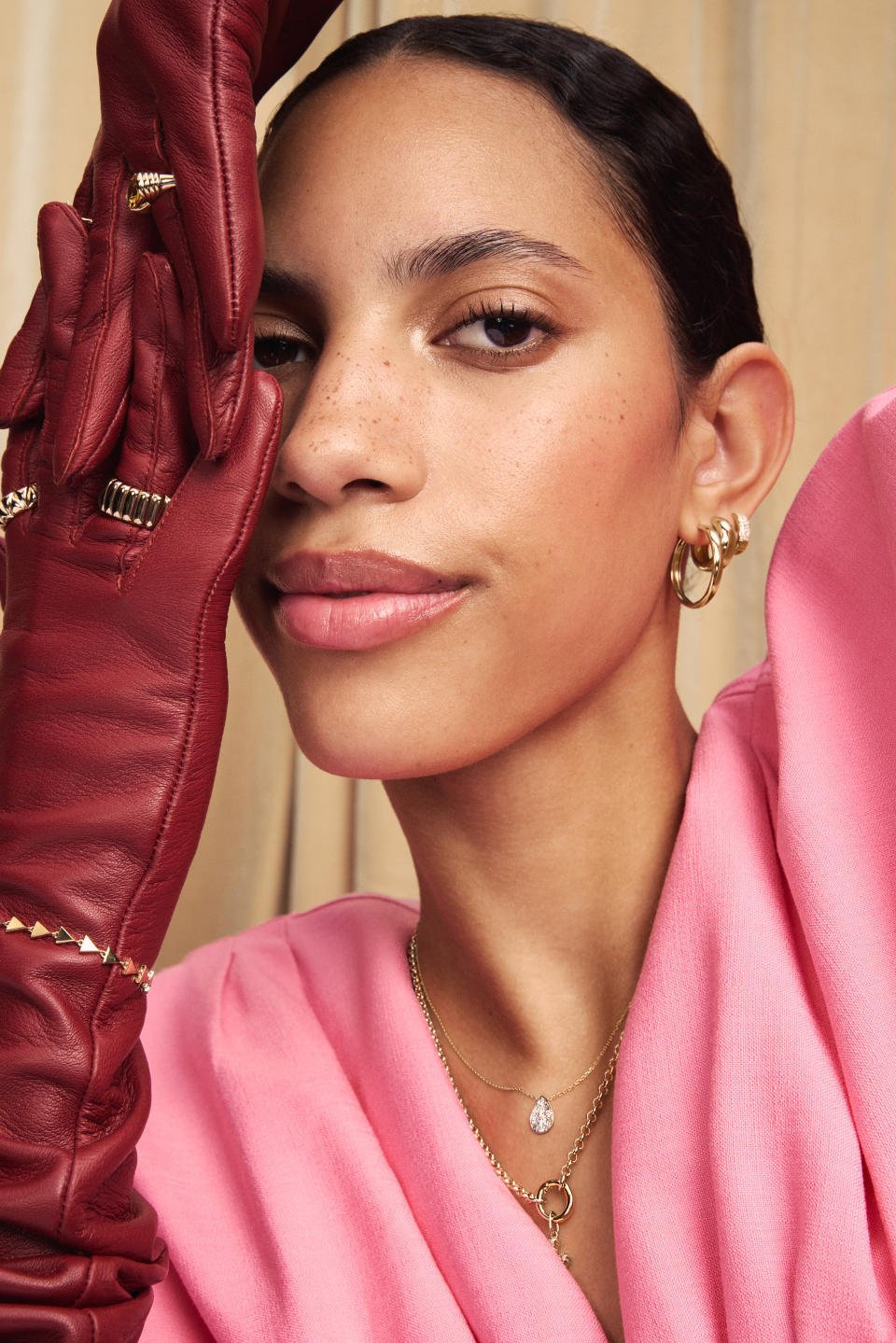
WWD: What’s the sustainability and social impact goal at Mejuri?
N.S.: We launched our first sustainability report and we’ve invested over $1.5 million in a regeneration project with Resolve, working to reduce the toxic byproducts of mining and bring back rehabilitation for those mining sites. We recycle our poly bags at our own expense and we’ve recycled 1.5 million a year in order to make sure that they go into the right recycling process.
We’ve also partnered with Design Thinking Africa, funding gemstone polishing scholarships for women in Zambia. I’m very passionate about the idea of investing in women so that they can design the life that they want and this is a balanced approach toward mining and recycling. It’s recognizing that while we want to have a positive impact on the environment, there are people who live off of mining, economies that are built off of it and we can’t neglect that part. In June 2020, we launched our Our Empowerment Fund after the killing of George Floyd. We wanted to be part of the positive change, I’ve always wanted to create this fund when we are much larger, but then I said to myself, “I don’t know why I’m waiting, even if it’s a small amount, we can be part of the conversation.”
WWD: How does it feel to be a female CEO running your own company and making all the decisions?
N.S.: I grew up in a household where we didn’t talk so much about gender in terms of what I can and cannot do. I don’t even think about it, it just feels intuitive and natural. I do feel quite proud to be able to represent and be an example to newcomers, I didn’t grow up in Canada, I’m a woman and I have an accent — all of these things that we’re not used to seeing in a CEO position.
WWD: How do you think motherhood has changed your perspective on being a CEO?
N.S.: I took about three months out, which was obviously very challenging, but we had just raised our Series B funding. We hear this a lot, but motherhood makes you more efficient. In the past I had no end time, I would work forever and nobody would be impacted. Work can expand for as long as you give it, but you can still do quality work within a smaller period of time. It also brings your perspective, everything used to be a big deal and then over time you start to feel this is just a different level of experience.
WWD: What kind of boundaries do you keep for yourself when you’re working?
N.S.: My husband and I work together, so we drop our children off every day to school and we have to put them to bed — sometimes we alternate days. Bedtime is non-negotiable for me. On the weekends, I absolutely have to do their activities and be with them.
WWD: How do you preserve your energy?
N.S.: I work out twice to three times a week and I play tennis. Sometimes after a 10-hour day, I still go out because it’s so important for me. I cook once a week, we have a lot of Middle Eastern food at home, but I also like Italian food.
Best of WWD

